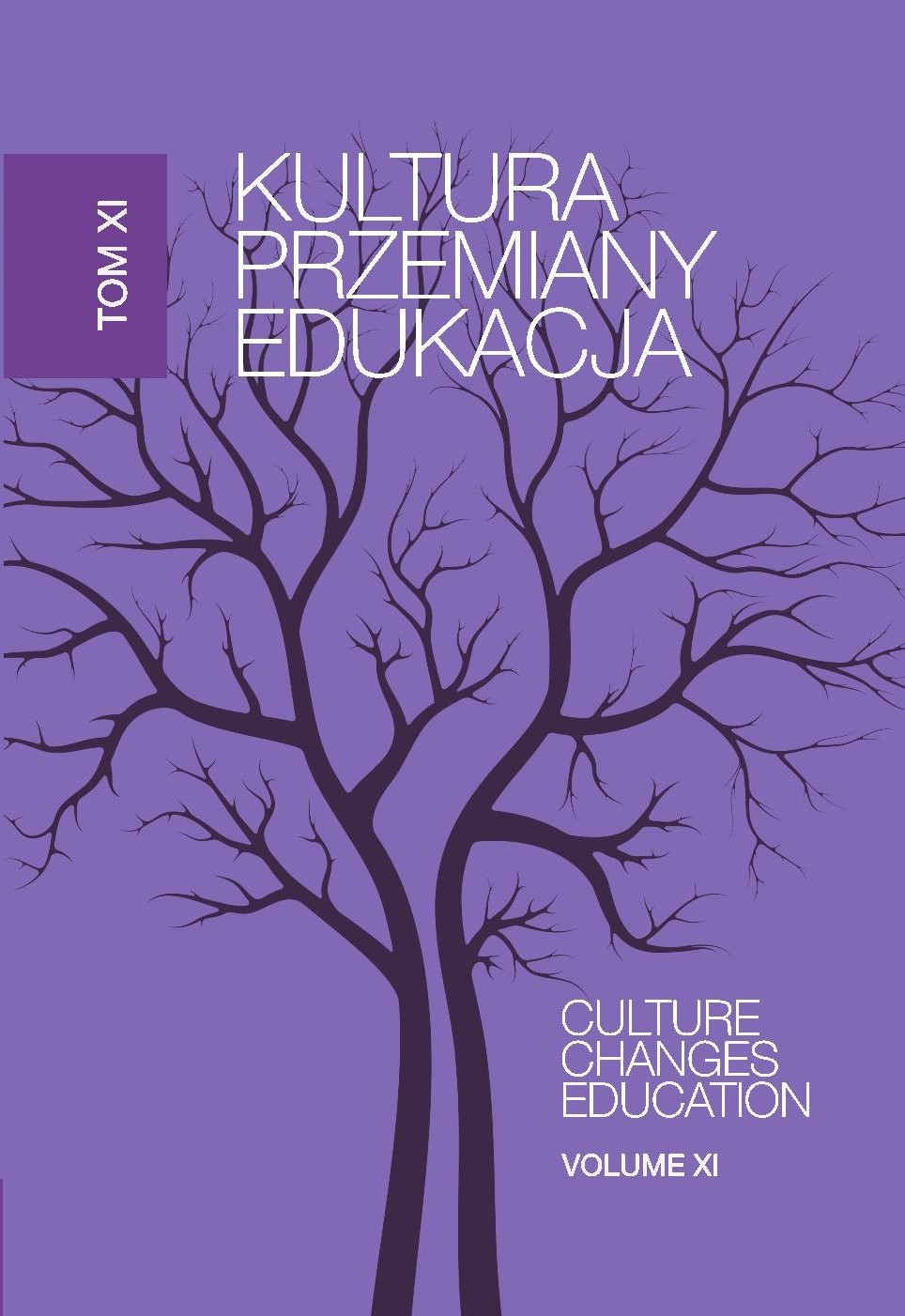Love as a value directing parents’ actions towards a disabled child unable to live independently after reaching adulthood
DOI:
https://doi.org/10.15584/kpe.2022.11.2Keywords:
love, parenthood, disabled child, inability to live independently after reaching adulthoodAbstract
Parental responsibility brings important values and feelings to life for both mother and father. New experience combines with giving and commitment. Parenthood becomes particularly difficult when a child is incapable of living alone. In such situations, parents refer to the perspective of love and concentrate on the progress in a child’s development. Writing this article, the author aimed at describing parenthood, performed by people who bring up wholly dependent children, in the context of seeking to define this process’ stages as well as actualised values. The studies use qualitative strategies (as the aim was to describe a socially constructed reality), with open interviews as a method. Collected narratives were categorised into four basic steps in the process of parenthood towards children incapable of living alone. They were as follows: opening up to a child, getting to know the child, understanding and acceptance. All these steps direct parental actions in terms of love and concern.
Downloads
References
Bakiera L., Stelter Ż., Rodzicielstwo z perspektywy rodziców dziecka pełnosprawnego i niepełnosprawnego intelektualnie, „Rocznik Socjologii Rodziny” 2010, t. XX.
Barłóg K., Wspomaganie rozwoju dzieci z niepełnosprawnością intelektualną w stopniu lekkim w różnych formach edukacji wczesnoszkolnej, Rzeszów 2008.
Błasiak A., Dybowska E, Rodzicielstwo i jego znaczenie dla procesu wychowania dziecka [w:] Wybrane zagadnienia pedagogiki rodziny, red. A. Błasiak, E. Dybowska, Kraków 2010.
Brągiel J., Znaczenie przemian społecznych dla współczesnego rodzicielstwa [w:] Rodzicielstwo w kontekście współczesnych przemian społecznych, red. J. Brągiel, B. Górnicka, Opole 2012.
Czerw M., Muchacka-Cymerman A., Poczucie wsparcia odczuwanego przez rodziny wychowujące dzieci z niepełnosprawnościami, „Praca Socjalna” 2020, nr 5.
Flick U., Projektowanie badań jakościowych. Niezbędnik badacza, Warszawa 2011.
Frączek Z., Rodzina miejscem odkrywania wartości miłości [w:] Wartości w pedagogice. Miłość jako wartość we współczesnej pedagogice, red. W. Furmanek, Rzeszów 2009.
Furmanek W., Miłość jako zjawisko duchowości człowieka [w:] Wartości w pedagogice. Miłość jako wartość we współczesnej pedagogice, red. W. Furmanek, Rzeszów 2009.
Garbulińska-Charchut J., Rodzina a dziecko niepełnosprawne w wieku przedszkolnym [w:] Rodzina: naturalna, duchowa, społeczna, red. J. Zimny, Wrocław 2020.
Gawlik E., Znaczenie opieki wytchnieniowej dla rodziców osób o niepełnej sprawności jako formy wsparcia: rozważania wstępne [w:] Edukacja jutra: oferta edukacyjna odpowiedzi na problemy współczesności, red. A. Małek-Kamińska, P. Oleśniewicz, Warszawa 2020.
Homplewicz J., Etyka pedagogiczna, Rzeszów 1995.
Homplewicz J., Pedagogika rodziny, Rzeszów 2000.
Kawecki I., Szkice z metodologii jakościowych badań edukacyjnych, Rzeszów 2018.
Kawula S., Człowiek w relacjach socjopedagogicznych. Szkice o współczesnym wychowaniu, Toruń 2004.
Konecki K., Studia z metodologii badań jakościowych. Teoria ugruntowana, Warszawa 2000.
Krąpiec M.A., Człowiek i prawo naturalne, Lublin 1999.
Kwak A., Społeczny i indywidualny wymiar rodzicielstwa [w:] Rodzicielstwo między domem, prawem, służbami społecznymi, red. A. Kwak, Warszawa 2008.
Lulek B., Miłość jako prawda istnienia, „Wychowawca” 1998, nr 9.
Lulek B., Miłość, wolność, otwartość, „Wychowawca” 1999, nr 9.
Lulek B., W poszukiwaniu dróg urzeczywistniania dobra dziecka. Pomiędzy współpracą a rywalizacją [w:] Wartości w pedagogice. Rodzina i szkoła środowiskami urzeczywistniania wartości, red. A. Długosz, Rzeszów 2015.
Lulek B., Wolność w wychowaniu, „Wychowawca” 2002, nr 2.
Ładyżyński A., Adopcja-rodzicielstwo na blogu odkrywane [w:] Rodzicielstwo w kontekście współczesnych przemian społecznych, red. J. Brągiel, B. Górnicka, Opole 2012.
Łukasik D., Niepełnosprawność dziecka a funkcjonowanie rodziny, „Studia Gdańskie” 2002, nr 47.
Marciniak‑Budecka D., Rodzicielstwo do-it-yourself, czyli refleksyjność współczesnego rodzicielstwa, „Pogranicze. Studia Społeczne” 2014, t. XXIV.
Marszałek J., Personalizm w pedagogice św. J. Bosko [w:] Poza kryzysem tożsamości w kierunku pedagogiki personalistycznej, red. F. Adamski, Kraków 1993.
Melosik Z., Edukacja uniwersytecka i stratyfikacja społeczna [w:] Edukacja i stratyfikacja społeczna, red. T. Gmerek, Poznań 2003.
Mendel M., Uczenie się rodziców, szkoła i Lifelong Learning [w:] Szkoła i rodzina w środowisku lokalnym – teoria i praktyka, red. A. Szczurek-Boruta, B. Chojnacka-Szynaszko, A. Gancarz, Toruń 2016.
Mendel M., Pedagogika miejsca wspólnego. Miasto i szkoła, Gdańsk 2017.
Obuchowska I., Rodzina a dziecko niepełnosprawne [w:] Dziecko niepełnosprawne w rodzinie, red. I. Obuchowska, Warszawa 1991.
Orlikowska M., Bołtuć I., Rodzicielstwo w rodzinie z dzieckiem z niepełnosprawnością intelektualną, „Acta Scientifica Academiae Ostroviensis. Nauki Humanistyczne, Społeczne i Techniczne” 2018, nr 12.
Sidor-Piekarska B., Wybrane aspekty wychowania dziecka z niepełnosprawnością intelektualną w stopniu umiarkowanym w perspektywie matek oraz kadry pedagogicznej, „Annales Uniwersitatis Maria Curie Skłodowska” 2015, t. XVIII.
Sosnowski T., Rodzina i rodzicielstwo – stan, zagrożenia, pedagogiczne postulaty zmian [w:] Zagrożenia człowieka i idei sprawiedliwości społecznej, red. T. Pilch, T. Sosnowski, Warszawa 2013.
Sowa J., Proces rehabilitacji, Warszawa–Rzeszów 2005.
Stelter Ż., Pełnienie ról rodzicielskich wobec dziecka niepełnosprawnego intelektualnie, Warszawa 2013.
Stelter Ż., Sposób realizacji roli rodzicielskiej wobec dziecka niepełnosprawnego intelektualnie, „Polskie Forum Psychologiczne” 2014, t. 19.
Doświadczenie choroby w rodzinie, red. B. Szluz, Rzeszów 2019.
Szluz B., Doświadczenie choroby dziecka w rodzinie (na przykładzie zespołu Pradera-Williego) [w:] Obraz życia rodzinnego i intymność. Książka dedykowana Profesor Annie Kwak, red. M. Bieńko, M. Rosochacka-Gmitrzak, E. Wideł, Warszawa 2020.
Borek J., Problemy rodziny z dzieckiem niepełnosprawnym [w:] Świadomość edukacyjna rodziców i pedagogów dziecka w wieku szkolnym. Zagadnienia wybrane, red. J. Borek, Radom 2020.
Szymanowska J., Wyzwania współczesnego dzieciństwa i rodzicielstwa – prolegomena do rozważań teoretycznych i rozwiązań praktycznych w płaszczyźnie wspierania dziecka i rodziny [w:] Wyzwania współczesnego dzieciństwa i rodzicielstwa, praca socjalna w perspektywie działań wychowawczych, red. J. Szymanowska, Toruń 2014.
Theiss W., Dom i ojczyzna – miejsca w świecie bez miejsc. Trzy perspektywy [w:] Dom i ojczyzna. Dylematy wielokulturowości, red. D. Lalak, Warszawa 2008.
Zasępa E., Rodzina z dzieckiem z zaburzeniami w rozwoju [w:] Psychologia kliniczna dzieci i młodzieży, red. I. Grzegorzewska, L. Cierpiałkowska, A. Borkowska, Warszawa 2020.
Downloads
Published
How to Cite
Issue
Section
License
Copyright (c) 2022 KULTURA – PRZEMIANY – EDUKACJA

This work is licensed under a Creative Commons Attribution-NoDerivatives 4.0 International License.


